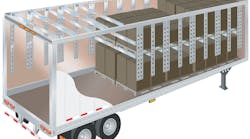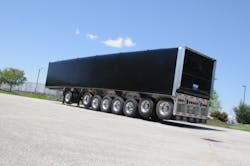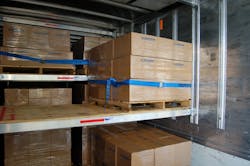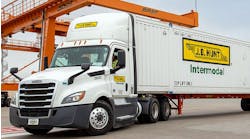Securing loads is only half the battle for many fleets. Ensuring those loads arrive at their destinations on time and in one piece is another battle carriers must fight. Fortunately, there are a number of load securement products on the market that can assist fleets of all types—from dry van, to refrigeration, to flatbed and even bulk operations — in accomplishing this task.
“There are many ways to quantify the return on a fleet’s investment in cargo securement equipment,” says Mark Arnold, manager of process improvement at Kinedyne Corp. “Most tie back to the ability to improve load factors and claim ratios, and to reduce safety occurrences. While quantifying the benefit of some devices is relatively easy in terms of compliance, calculations on other investments are more complex, but the returns are significant so the effort is worthwhile.”
To prove conclusively that its mechanical tarp systems improve fuel efficiency on empty and loaded bulk trailers, ElCargo Fabrication put the solutions to the test at Energotest, a biannual event conducted by FPInnovations’ Performance Innovation Transport (PIT) group, a not-for-profit engineering and research center.
“We submitted a representative mechanical tarp system for bulk semi-trailers,” says Roger Lussier, sales manager at ElCargo. Fuel consumption was measured by weighing portable tanks. Tests were conducted using a control vehicle and test units equipped with the mechanical tarp system.
“We now have independent verification of a 14.93% fuel economy benefit when a loaded or empty bulk trailer is covered with a mechanical tarp system,” he added.
It is also essential that fleets don’t overlook driver training for cargo control products, notes Jeff Boyd, director of sales at Aero Industries. “Misuse of cargo control solutions can lead to delays, cargo damage or loss, and injuries,” he says. “Fleets can reduce misuse by choosing products that are user-friendly. They should also take advantage of training tools and manuals for operators provided by manufacturers.”
“Using cargo control equipment properly will determine not only how effective that piece of equipment performs in transit, but it will also reduce the risk of failure and undue wear and tear,” states Kinedyne’s Arnold. “A user’s better understanding of the equipment’s capabilities, limits and proper use helps ensure that regulatory requirements are met, and that the full return on the investment is realized.”
Kinedyne offers a full line of load securement products, including its Kaptive Beam System, a double-decking solution using a series of tracks and beams permanently mounted inside a trailer. Each beam in the product is adjustable in 2-in. increments and can be used in 96- and 102-in.-wide trailers. The beams have a vertical working load limit of 2,200 lbs. and a horizontal rating of 1,500 lbs. Tracks for most Kaptive Beam Systems are available for surface mount and sheet and post trailer installations.
Aero Industries’ Conestoga sliding tarp system for flatbed and drop deck trailers features a front and rear locking mechanism and steel wheels on a stainless steel track. Conestoga is made to each fleet’s specifications for 96- or 102-in. trailers; users can choose double, quad or quint uplift bows. An optional DOT-rated bulkhead is also available.
Other suppliers in the cargo securement market include Ancra International, which manufactures a range of cargo control solutions including the Lift-A-Deck II system for decking freight inside van trailers. For flatbeds, Ancra has its X-Treme winch and ratchet tie downs, along with the Ergo 360 winch bar. Offered in standard combination and box end combination models to suit various applications, the bars are designed to be rotated 360 deg. while keeping the handle and tip in alignment for better leverage.
Save-A-Load’s Heavy Duty IQ 200 hydraulic load bar, which extends from 83 to 114 in., can be used vertically or horizontally inside dry or refrigerated trailers. The load bar is designed to maintain contact with trailer walls and compensate for flexing, expansion and contraction due to temperature variations. The bars also feature a pushbutton release mechanism and an articulating foot that helps hold them in place while preventing punching through trailer walls.
“Fleets will see a noticeable return on investment when they purchase quality cargo securement products,” says Jeff Boyd at Aero Industries. “These technologies can mitigate driver injury risk and reduce costs associated with cargo loss or damage.”
For more information, visit these websites:
Aero Industries
www.aeroindustries.com
Ancra International
www.ancra.com
ElCargo Fabrication
www.elcargo.com
Kinedyne Corp.
www.kinedyne.com
Save-a-Load
www.saveaload.com





